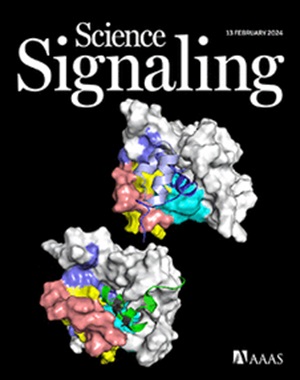在斑马鱼造血干细胞发育过程中,表皮生长因子受体依赖性内吞 Wnt9a 和 Fzd9b,促进β-catenin 信号传导
IF 6.6
1区 生物学
Q1 BIOCHEMISTRY & MOLECULAR BIOLOGY
引用次数: 0
摘要
通过与 Frizzled(Fzd)跨膜受体家族成员结合的分泌型 Wnt 配体进行的细胞间通讯对发育和稳态至关重要。Wnt9a通过Fzd9b、共受体LRP5或LRP6(LRP5/6)以及表皮生长因子受体(EGFR)发出信号,在发育过程中促进斑马鱼和人类造血干细胞的早期增殖。在这里,我们开发了荧光标记的、具有生物活性的Wnt9a和Fzd9b融合蛋白,证明配体-受体复合物的信号传导需要表皮生长因子受体依赖性内吞作用。在人体细胞中,Wnt9a-Fzd9b复合物被快速内吞并通过早期和晚期内体、溶酶体和内质网运输。利用小分子抑制剂和基因敲除方法,我们发现 Wnt9a-Fzd9b 的内吞需要表皮生长因子受体介导的 Fzd9b 尾部、洞穴素和支架蛋白表皮生长因子受体蛋白底物 15(EPS15)的磷酸化。Wnt9a-Fzd9b信号转导需要LRP5/6和下游信号转导成分AXIN,但内吞却不需要。EPS15的敲除或缺失会影响斑马鱼造血干细胞的发育。其他Wnt配体的信号活动不需要内吞,这意味着特定的内吞和转运模式可能是建立Wnt-Fzd特异性的一种方法。本文章由计算机程序翻译,如有差异,请以英文原文为准。
EGFR-dependent endocytosis of Wnt9a and Fzd9b promotes β-catenin signaling during hematopoietic stem cell development in zebrafish
Cell-to-cell communication through secreted Wnt ligands that bind to members of the Frizzled (Fzd) family of transmembrane receptors is critical for development and homeostasis. Wnt9a signals through Fzd9b, the co-receptor LRP5 or LRP6 (LRP5/6), and the epidermal growth factor receptor (EGFR) to promote early proliferation of zebrafish and human hematopoietic stem cells during development. Here, we developed fluorescently labeled, biologically active Wnt9a and Fzd9b fusion proteins to demonstrate that EGFR-dependent endocytosis of the ligand-receptor complex was required for signaling. In human cells, the Wnt9a-Fzd9b complex was rapidly endocytosed and trafficked through early and late endosomes, lysosomes, and the endoplasmic reticulum. Using small-molecule inhibitors and genetic and knockdown approaches, we found that Wnt9a-Fzd9b endocytosis required EGFR-mediated phosphorylation of the Fzd9b tail, caveolin, and the scaffolding protein EGFR protein substrate 15 (EPS15). LRP5/6 and the downstream signaling component AXIN were required for Wnt9a-Fzd9b signaling but not for endocytosis. Knockdown or loss of EPS15 impaired hematopoietic stem cell development in zebrafish. Other Wnt ligands do not require endocytosis for signaling activity, implying that specific modes of endocytosis and trafficking may represent a method by which Wnt-Fzd specificity is established.
求助全文
通过发布文献求助,成功后即可免费获取论文全文。
去求助
来源期刊

Science Signaling
BIOCHEMISTRY & MOLECULAR BIOLOGY-CELL BIOLOGY
CiteScore
9.50
自引率
0.00%
发文量
148
审稿时长
3-8 weeks
期刊介绍:
"Science Signaling" is a reputable, peer-reviewed journal dedicated to the exploration of cell communication mechanisms, offering a comprehensive view of the intricate processes that govern cellular regulation. This journal, published weekly online by the American Association for the Advancement of Science (AAAS), is a go-to resource for the latest research in cell signaling and its various facets.
The journal's scope encompasses a broad range of topics, including the study of signaling networks, synthetic biology, systems biology, and the application of these findings in drug discovery. It also delves into the computational and modeling aspects of regulatory pathways, providing insights into how cells communicate and respond to their environment.
In addition to publishing full-length articles that report on groundbreaking research, "Science Signaling" also features reviews that synthesize current knowledge in the field, focus articles that highlight specific areas of interest, and editor-written highlights that draw attention to particularly significant studies. This mix of content ensures that the journal serves as a valuable resource for both researchers and professionals looking to stay abreast of the latest advancements in cell communication science.
 求助内容:
求助内容: 应助结果提醒方式:
应助结果提醒方式:


